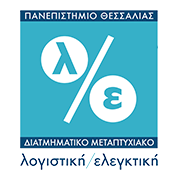Money and Capital Markets
(1) GENERAL
| SCHOOL | SCHOOL OF ECONOMICS AND BUSINESS | ||||
| SECTION | DEPARTMENT OF ECONOMICS AND DEPARTMENT OF ACCOUNTING & FINANCE | ||||
| LEVEL OF STUDIES | POSTGRADUATE LEVEL | ||||
| COURSE CODE | MA34 | SEMESTER OF STUDY | 3 | ||
| COURSE TITLE | MONEY AND CAPITAL MARKETS | ||||
|
INDEPENDENT TEACHING ACTIVITIES |
WEEKLY TEACHING HOURS | CREDIT UNITS | |||
| LECTURES | 3 | 7 | |||
|
TYPE OF COURSE |
REQUIRED |
||||
| PREREQUISITE COURSES: | NO | ||||
| LANGUAGE OF TEACHING AND
EXAMINATION: |
GREEK / ENGLISH | ||||
| THE COURSE IS OFFERED TO ERASMUS STUDENTS | NO | ||||
| ELECTRONIC COURSE PAGE (URL) | https://eclass.uth.gr/ | ||||
| understand capital markets products and their valuation methods
understand the role of Central Banks in modern economies and the role of central banks in the markets |
| • |
| The aim of the course is to provide a deeper understanding of banking, monetary and capital
markets in order to provide a more complete understanding of the ways in which banks, capital markets and the Central Bank operate in modern economies. By successful response to the requirements of the course students are expected to: • understand the basic tools of investment appraisal • understand how the money market and the foreign exchange market work • understand financial intermediation • structure portfolios of securities and measure their performance and risk • |
| Learning Outcomes |
(2) LEARNING OUTCOMES
| • Search, analysis and synthesis of data and information, using both the
necessary technologies • Decision-making • Autonomous work • Teamwork • Working in an international environment • Working in an interdisciplinary environment • Generating new research ideas • Respect for the natural environment |
| General skills |
| • Demonstrate social, professional and ethical responsibility
• Promoting free, creative and inductive thinking |
| The course presents specialised topics in the field of banking
economic and capital markets. The basic principles of investment appraisal, money and capital markets and the role of banks in the modern environment are studied. Issues relating to securities valuation and portfolio structuring are analysed. Particular emphasis is also placed on investment firms and the structuring of investment strategies, as well as the role of monetary authorities in markets. More specifically, during the teaching of the course the following modules will be covered: • Principles of Investments (Principles of Investments) • Money Market Products and the Foreign Exchange Market (Money Markets & Forex Market) • Principles of Portfolio Management. • Capital Markets and Asset Pricing (Capital Markets and Asset Pricing) • Investment Companies (Investment Companies) • Investment Strategies (Investment Strategies) • Financial Crises and Debt Crises (Financial Crises- Debt Crises) |
(3) COURSE CONTENT
(4) TEACHING and LEARNING METHODS – EVALUATION
| METHOD OF DELIVERY | On Site & Distance learning – Hybrid room | |||
| USE OF INFORMATION AND COMMUNICATION TECHNOLOGIES | Use of a hybrid room that includes a large
a wall-mounted screen on which the participants are presented remotely. The connection to the course is made through the Microsoft Teams software, in which a camera is connected to the course. in the room is recorded and illustrated by the teacher. The attendance of the course is also done with the use of the Wacom digital pen, which ensures the interactivity of the lesson with notes that appear directly on the students’ screen. In addition, slides are projected, use of the asynchronous education platform for the posting of course materials, students’ assignments and and communication between lecturers and students, search for electronic journals and resources. |
|||
| ORGANISATION OF TEACHING | Activity | Semester workload | ||
| Lectures | 36 | |||
| Study, preparation and presentation of activities |
130 |
|||
| Study and analysis of the literature
(preparation of lectures & exams) |
41 |
|||
| Final written examination | 3 | |||
| Total Course |
210 |
|||
| STUDENT ASSESSMENT
. |
The assessment is carried out in Greek or in English and is based on a written examination of a multiple-choice test (70%) and an individual 2000-word paper on one of the
course topics (30%) at the end of the semester. |
|||
(5) RECOMMENDED-BIBLIOGRAPHY
| – Suggested Bibliography:
– Syriopoulos K. and Papadamou S. (2014) Introduction to Banking Economics and the Capital Markets, Utopia Publications (SP). – Papadamu St. Siriopoulos K. (2016) Basic Principles of Investment Evaluation. |
| – Papadamu S. (2009), Portfolio Management: A Modern Approach, Publications, Papers
(P.P. Papadopoulos, P.P. Papadopoulos, P.P. Gutenberg (PAP) – Bodie Zvi, Kane Alex, Marcus Alan J. (2014) Investments, Utopia Publications – Antzoulatos, A. (2011) Governments, financial markets and macroeconomics,
– Laopodis, N. (2012) Understanding investments: theories and strategies, Routledge. |
| – |
| Mishkin F. S (2016) The Economics of Money, Banking and Financial Markets, (11th |
| – Elton, E., Gruber, M., Brown, S., Goetzmann (2010) Modern Portfolio Theory and Investment
Analysis, 8th Edition |
You may also like
Sustainable Accounting – Non-Financial Information
(1) GENERAL SCHOOL SCHOOL OF ECONOMICS AND BUSINESS SECTION DEPARTMENT OF ECONOMICS AND DEPARTMENT OF ACCOUNTING & FINANCE LEVEL OF STUDIES POSTGRADUATE LEVEL COURSE CODE MA09 SEMESTER OF STUDY 3 …
Corporate Governance & Corporate Social Responsibility
(1) GENERAL SCHOOL SCHOOL OF ECONOMICS AND BUSINESS SECTION DEPARTMENT OF ECONOMICS AND DEPARTMENT OF ACCOUNTING & FINANCE LEVEL OF STUDIES POSTGRADUATE LEVEL COURSE CODE MA04 SEMESTER OF STUDY 3 …

